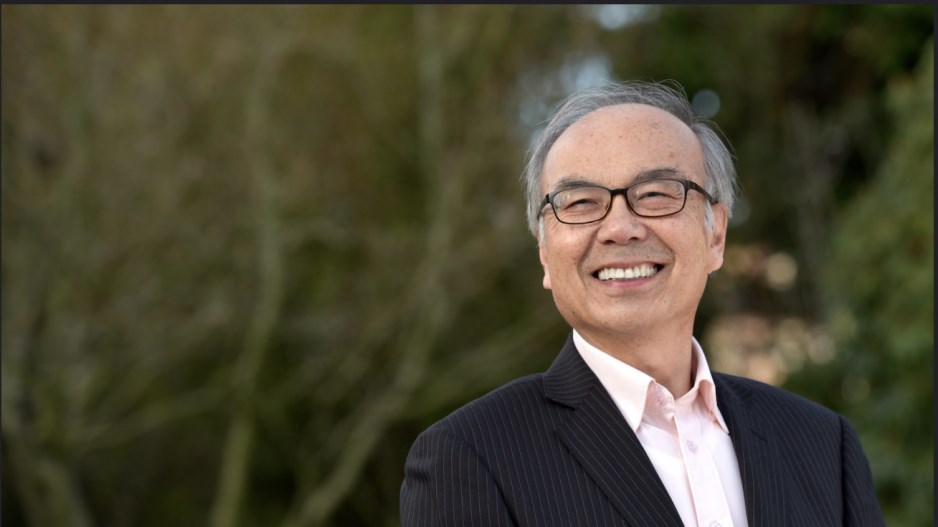B.C.’s Minister of State for Trade George Chow attended a Huawei-sponsored Chinese cultural event and a celebration of the Chinese Communist Party as the MLA for his Vancouver-Fraserview riding, but not as a cabinet minister, according to a government spokesperson.
“MLA George Chow did not attend the event on behalf of the B.C. government. He attended the event as a Vancouver area MLA and a member of the Chinese-Canadian community,” stated a spokesperson by email, on behalf of the Ministry of Jobs Economic Recovery and Innovation, which oversees Chow’s cabinet duties.
The statement was in response to Glacier Media asking for Chow to explain why he attended the events earlier this month. Glacier Media did not ask Chow how he was representing himself. And while this is what Chow’s ministry wanted to impress upon the general public, it was not the impression event attendees took away, given the fact Chow was introduced as the Minister of State for Trade by the event’s organizers.
On the heels of Canadians Michael Spavor and Michael Kovrig being released from Chinese prisons following the conclusion of Huawei CFO Meng Wanzhou’s extradition process, Chinese telecommunications giant Huawei sponsored the Chinese government-linked cultural event in Downtown Vancouver October 2, with Chow and other hand-picked B.C. politicians in attendance waving both Canadian and Chinese flags to celebrate the upcoming Beijing Winter Olympics, which are subject to boycott calls that have majority support among polled Canadians.
The event was one of many Chinese cultural events tied to China’s consul general in Vancouver that weekend, and in conjunction with celebrations for the National Day of the People’s Republic of China, also known as the Golden Week Holiday.
Chow’s attendance made it less clear whether his BC NDP provincial government is set to encourage trade ties with China. Minister of Jobs, Economic Recovery and Innovation Ravi Kahlon oversees Chow’s ministerial post. This summer, when asked if his government intended to strengthen trade ties with China or diversify, Kahlon affirmed the latter. In May, the government did not renew a memorandum of understanding on China’s Belt and Road Initiative signed by the BC Liberal government in 2016.
Chow was first elected MLA in 2017. He’s a former Vancouver city councillor and past president of the Chinese Benevolent Association, which publicly defends controversial Beijing policies, such as Hong Kong’s national security law.
According to Simon Fraser University political science professor Stewart Prest, elected officials will sometimes opt for more partisan positions by acting as local representatives, although it comes at the peril of the public being able to understand such nuance.
“You could say that, perhaps, they're trying to find a way to have their cake and eat it too,” said Prest.
“This is a way in which we try to grapple with some uncomfortable, at times, but unavoidable, tensions within a political system. People are representatives — they're members of cabinet — but they're also their own person. So at times, they will look to differentiate their roles and that attempt can become unsustainable at times,” explained Prest.
Prest said it becomes a political question when determining if the public accepts such differentiations.
In Chow’s case, said Prest, “if it became part of a broader story of close ties between this government and not just Chinese-Canadian communities, but also Chinese state enterprises or something like that, then I think it would become a more significant problem for this government.”
Prest said he expects Sino-Canadian relations to be more closely watched “as these events become more common in a post-COVID era.”
Only one in 10 Canadians now hold a “favourable or very favourable” view of China, down from 38% in 2018, leading up to the Meng saga.
The cultural event was the third Chinese Cultural And Arts Festival hosted at Jack Poole Plaza by the Canadian Alliance of Chinese Associations. Among those attending with Chow were Liberal-appointed independent Senator Yuen Pau Woo, Burnaby city councillor James Wang, Richmond city councillors Alexa Loo and Chak Au and Vancouver mayoral candidate Ken Sim.
The alliance states online it aims to promote “unity and cooperation between Chinese communities” while participating in select philanthropic efforts such as disaster relief.
While it has claimed to be apolitical, it also claims to “actively participate in various activities of the Overseas Chinese Affairs Office and the Chinese Overseas Chinese Federation,” which are Chinese government-affiliated entities, identified as parts of the CCP’s United Front Work Department. Among its stated goals in Canada is to promote Chinese sovereignty in the South China Sea.
Where Chow and others were not in attendance during the Golden Week was next to pro-democracy activists outside the consul general’s compound on Granville Street.
The activists co-organized by the group Vancouver Society in Support of Democratic Movement gathered to raise more awareness for China’s treatment of Uygur Muslims in East Turkistan (Xinjiang Autonomous Region), which the House of Commons has labelled as genocide; dismantling of Hong Kong’s democratic system; and sustained intrusions on Tibetan culture.




